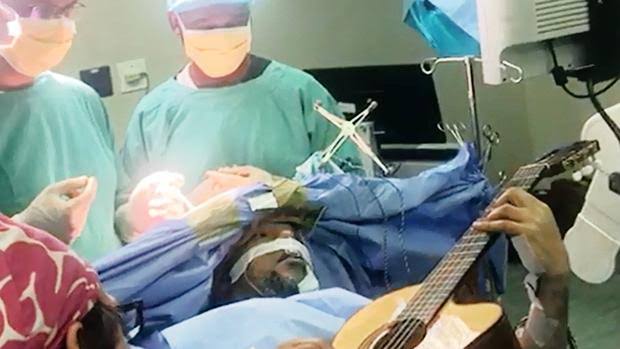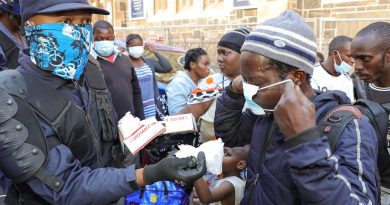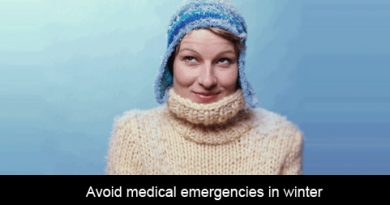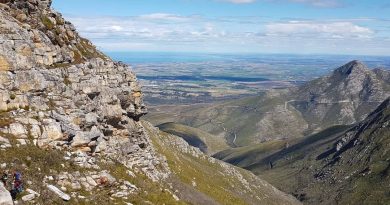From Umlazi to the World: DR Basil Enicker making international headlines for removing brain tumour from a Jazz artist while he is awake
The Umlazi-born doctor who is making international headlines for removing a brain tumour from a jazz musician while he was awake wants South Africans at large to drink less alcohol in order to avoid interpersonal violence and road traffic crashes that result in traumatic brain and spinal cord injuries.
Dr Basil Enicker, 41, is the head of the Neurosurgery unit at the Inkosi Albert Luthuli Central Hospital. He led a team that performed surgery on jazz artist and UKZN music lecturer Musa Manzini last month. And since then, Dr Enicker has been inundated with interview requests, and even attracted the attention of the BBC and Carte Blanche. He has been regaling them all about this success story from the KZN Department of Health.
KwaZulu-Natal Health MEC has also congratulated Dr Enicker, and hailed him as a great example of what can be achieved through hard work and tenacity. “His is a very encouraging story. We need to put in place systems that will ensure that more Black Africans are afforded the space and support to realise their potential like Dr Enicker. We are extremely proud of him, and what he’s achieved,” said the MEC.
In this Q&A interview, Dr Enicker answers a few more pertinent questions about his career, and6 impressive rise through the ranks despite formidable odds.
HOW DO YOU FEEL ABOUT ALL THIS MEDIA ATTENTION?
As a Head of Department of Neurosurgery, my team and I are excited and at the same time humbled by the positive feedback that the Department has received regarding the treatment rendered to Mr Manzini (who gave written consent about the public disclosure of his operation).
This is one of many positive stories highlighting the quality of care rendered in the public health system in South Africa and in particular KwaZulu-Natal.
Awake craniotomy is the standard of care in many centres internationally. Inkosi Albert Luthuli Central Hospital is one of select centres in South Africa that offers this type of surgical procedure. Excitement around this operation is related to the fact that it tells a good South African story, of how an individual like Mr Musa Manzini has had to overcome major health challenges after being diagnosed with a brain tumour (this was his third operation), and that despite these challenges he continues to make inspiring music and also teach music to University students. He is a role model to a lot people, especially the young.
What is unique and exciting about the procedure itself, is that it was the first time it was performed on a musician at Inkosi Albert Luthuli Central Hospital and as one the many tools of testing used during the procedure we asked him to play the guitar, while we operated on his brain. The reason being the need to maintain and improve use of fine motor skills of the left hand, including ability to continue making music. The brain tumour was located in the right frontal lobe (in the primary motor cortex) which is an area of the brain responsible for planning, control and execution of voluntary movements. The procedure was a huge success.
The Neurosurgery Department in KZN also has young leadership, who are dedicated to improving the lives of the people of KZN, while offering comprehensive neurosurgical services.
This story has been a great opportunity to educate the South African population and Africa at large about brain tumours: their clinical presentation, diagnosis and management. It also inspires young people, especially those seeking to pursue a career in the medical profession, about the discipline of Neurosurgery, as most medical students are not exposed to this field – especially those from previously disadvantaged backgrounds.
WHAT OTHER MEMORABLE OR UNUSUAL OPERATIONS HAVE YOU BEEN INVOLVED IN?
There are too many to mention. The Department of Neurosurgery at Inkosi Albert Luthuli Central Hospital is one of the busiest in the country, and caters for the whole of KZN. We treat a wide spectrum of conditions affecting the brain and spine, ranging from tumours and congenital abnormalities, to trauma, infections, vascular abnormalities and degenerative conditions of the spine. We pride ourselves in offering comprehensive neurosurgical services in the province, despite the heavy workload.
TELL US ABOUT YOUR UPBRINGING AND FORMATIVE YEARS?
I was born in Durban, and grew up at Umlazi Township, Z section. Growing up in the township in the 80s and 90s was typical of those times. My memories include a strong sense of community and playing soccer in the streets. I remember the long walks to school in the mornings and afternoons, and those memorable trips in the buses and taxis in the township.
During those times, there would be many strikes and protest action as a result of the political climate during the pre-1994 era, that made it a challenge to get to school.
I attended my primary school up to standard 6 (Grade 8) at Umlazi. From Standard 7 (Grade 9) to Matric (Grade 12), I attended a boarding school: St. Francis College in Marrianhill.
My family had instilled in me the importance of education from a young age. My mother Balekile, who is the rock of the family, was a teacher a Zwelethu High at Umlazi, for over 30 years. She retired 5 years ago. She did a wonderful job in providing for me and my two sisters, Linda and Sazi. My father, Addie was also a teacher at Umlazi and become a guitarist, when he retired from teaching. He passed away in 2008 due to cancer. My parents divorced when I was young.
My grandparents played an important part in my upbringing. My grandfather Basil Mdege was a Principal at Swelihle High School at Umlazi until he retired. He was strict and a disciplinarian. He was instrumental in putting me through medical school. He passed away a few days after I qualified as a Neurosurgeon, and that had a profound effect on my life.
My grandmother Nomusa Mdege is a retired Professional Nurse who worked in the Paediatrics Department at King Edward VIII Hospital until retirement. She is kind and compassionate, and instilled in me a strong sense of giving back to those less fortunate. She also taught me how to drive a car.
WHO WOULD YOU SAY HAD THE BIGGEST IMPACT ON YOUR LIFE DURING YOUR FORMATIVE YEARS, AND ALSO PROFESSIONALLY?
In addition to my mother and grandparents, professionally it would have to be Prof Thandinkosi Madiba, the past head of Department of Surgery at the University of KwaZulu-Natal. He has been a mentor and role model since I was a medical student. I stand on his shoulders. My friends who were my classmate in medical school have played a vital role in motivating me.
WHAT MADE YOU WANT TO PURSUE A CAREER IN MEDICINE IN GENERAL, AND NEUROSURGERY IN PARTICULAR?
My grandmother was a nurse so I was always fascinated by her work with sick children. She would care for me and my siblings when we were sick. In that regard from a young age I wanted a career in health care. It was during my years in medical school that I was fascinated by the human brain and how it worked.
After community service, I went to the Department of Neurosurgery at Inkosi Albert Luthuli Central Hospital to enquire about a job and the rest is history.
WHAT QUALIFICATIONS DO YOU HOLD?
I have a Bachelor of Medicine and Surgery obtained at the Nelson R. Mandela School of Medicine, obtained from the University of Natal (now the University of KwaZulu- Natal) in 2002; Master of Medicine (Neurosurgery) obtained from the University of KwaZulu-Natal; and I am a Fellow of the College of Neurosurgeons of South Africa (Colleges of Medicine of South Africa). I did my post graduate studies (specializing in Neurosurgery) through the University of KwaZulu-Natal, at Inkosi Albert Luthuli Central Hospital, and graduated as a specialist Neurosurgeon in 2010.
DID YOU ALWAYS HAVE THE FUNDS TO STUDY?
Funding for my undergraduate degree was a big problem. My University education was funded with the assistance of my late grandfather and through loans. The means of funding tertiary education remains a big problem for a lot of young people in South Africa.
WHAT SACRIFICES DID YOU HAVE TO MAKE ALONG THE WAY TO GET YOUR JUNIOR DEGREE, AND ALSO TO FURTHER YOUR STUDIES AND GET TO WHERE YOU ARE?
For my Junior degree, I basically had no social life because I spent any of my free time studying. For my post-graduate studying and training, I had to sacrifice time with family and friends, and actually started my family quite late in my life.
Specialising in Neurosurgery is extremely demanding. The days are long, and the after-hours emergency work is busy. My free time during training was dedicated to sleeping in order to recover from the calls. It was also dedicated to studying for exams and preparing for theatre cases.
ONE OF THE STRIKING THINGS ABOUT YOU IS HOW HUMBLE AND DOWN-TO-EARTH YOU SOUND. DESCRIBE YOURSELF IN FIVE WORDS.
I’m compassionate, ambitious, patriotic, focused and optimistic.
WHAT LIFESTYLE CHANGES DO SOUTH AFRICANS NEED TO MAKE IN ORDER TO MAKE YOUR JOB AS A NEUROSURGEON EASIER AND LESSEN THE WORKLOAD?
• Maintain a healthy diet and exercise on a regular basis. Quit smoking and don’t use recreational drugs as this reduces the risk of intracranial bleeding / stroke.
• Manage stress.
• Get regular health check-ups: control of high blood pressure and diabetes mellitus for those affected by these conditions is important as it reduces the risks of stroke.
• Avoid abuse of alcohol as this often leads to interpersonal violence and road traffic crashes, resulting in traumatic brain and spinal cord injury.
• For those patients infected with HIV, regular check-ups and compliance with Anti-Retroviral Therapy is important to reduce the risk of HIV-associated lesions of the brain and spinal cord, such as TB.
TELL ME ABOUT YOUR FAMILY?
I am married to a wonderful lady by the name of Dr. Zanele Nkosi- Enicker. She is a Specialist Radiation Oncologist in private practice. We have two amazing children, a three year-old son (Lisolethu) and 1 year-old daughter (Nala). We are a typical South African family who enjoy spending quality time together. We love to experience and savour all the wonderful things our great country has to offer.
GIVEN YOUR BUSY SCHEDULE, HOW DO YOU STRIKE A BALANCE BETWEEN WORK AND FAMILY LIFE?
Life as a Neurosurgeon is extremely busy and demanding. It is filled with all kinds of pressures. Operating on the brain and spinal cord is intense and leaves no room for error. You need to be focused at all times. I still struggle with finding a balance between family and work. However, at the end of the day things always seem to work out, thanks to the support I have from my wife. I really love what I do especially since I get to help patients who have nowhere else to go, as the majority of the population in KZN make use of the public health care system. Neurosurgery for me is a passion and I don’t see myself doing any other kind of job. I also go to the gym on a regular basis to stay healthy and relieve stress. I wake up early in the mornings to meditate before I start with my daily busy schedule. I find that it helps to clear my head and stay focused.
WHAT KIND OF MUSIC DO YOU LISTEN TO IN YOUR SPARE TIME?
I listen to a variety of music such as R & B, Hip Hop, Jazz and classical music. I am a big fan of South African music regardless of the genre.
WHAT WORDS OF WISDOM CAN YOU SHARE WITH YOUNG DOCTORS, AS WELL AS YOUNG PEOPLE, WHO WANT TO GO FAR IN THIS PROFESSION?
The great Nelson Mandela once said, “Education is the most powerful weapon which you can use to change the world”. I can never overemphasise the importance of investing in education and skills training, as this helps to unlock limitless opportunities. A successful career in medicine and in particular Neurosurgery involves hard work, attention to detail, dedication, sacrifice and going the extra mile. It also requires empathy and putting the interests of patients above everything else. Everything you do as a doctor should be for the advancement of the health of the patient. Young people should surround themselves with positive people, who are like- minded and who will inspire them to persevere and attain their goals and dreams. It is also critical to find mentors/ role models to enhance the journey to success.
WHAT ARE YOUR MID AND LONG-TERM GOALS?
I am currently pursuing a PhD in Neurosurgery through the University of KwaZulu-Natal, and am aiming to complete it in the near future.
As a Head of Department of Neurosurgery at the University of KwaZulu-Natal, my goal is to improve research output of my Department, while increasing collaboration with local and international partners.
My long-term goal is to train as many neurosurgeons as possible and groom the next generation of leaders in Neurosurgery. I would love to see an increase in the number of Neurosurgery units in the Province of KwaZulu-Natal by setting up units in hospitals like Grey’s and Ngwelezane. Ultimately, I would love to have a positive impact on the lives of as many patients as possible.
From Umlazi to the World: Dr Basil Enicker making international headlines for removing brain tumour from a Jazz artist while he is awake https://t.co/eQMVl5fhXm @KZN_EMS @robz_mckenzie pic.twitter.com/CMuEKjz9tk
— Arrive Alive (@_ArriveAlive) January 20, 2019




